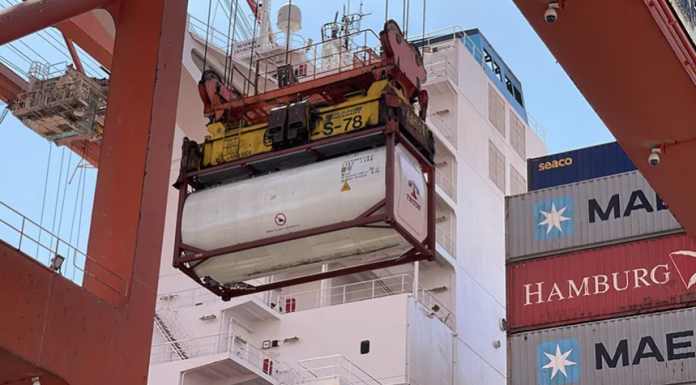Α team of three Maersk employees, who are former seafarers, decided to undertake an innovative project that could store and deliver fresh water from vessels to ports, aiming to provide a solution for fresh water scarcity faced by regions all over the world.
Cargo ships undertaking global trade are equipped with fresh water generator systems that produce clean drinking water by distilling sea water using heat energy harnessed from their engines. Traditionally, this system has been used to generate water for consumption only onboard the vessels. However, the excess water produced has been overlooked. Through this project, this untapped resource has been capitalised on by optimising the process and storing the excess water in tank containers before delivering it to ports.
Each vessel can fill two tank containers on an average sea voyage between two ports. With the process optimised and tank containers stored at the right location onboard, two tank containers with a combined capacity of 50,000 litres can be filled with fresh water. Amongst the first pilot runs were the deliveries at Sri Lankas’ Port of Colombo and Oman’s Port of Salalah of two tank containers, each filled with 25,000 litres of fresh water.
“The first tank container of fresh water delivered by Maersk from its vessel is an important milestone that has the potential to pave the path for a larger scheme of things. This project opens doors for many more ships moving around the world, which can replicate this system and create an incredibly large supply of fresh water that is being delivered all around the world to address the ever-increasing challenge of water scarcity,” stated Keld M Christensen, CEO of Port of Salalah.
Leonardo Sonzio, Head of Fleet Management and Technology at Maersk, described the possibility to generate, store and deliver fresh water from ships as a “unique opportunity” to address water scarcity.
“The successful conclusion of the pilot deliveries is a testament to the innovative capabilities and perseverance of our team. The next step for us would be to explore the possibilities of expanding our efforts to more ports and collaborate with beneficiary stakeholders worldwide. Together, we could make a significant impact by improving the access to clean drinking water for communities in need, too,” he said.







